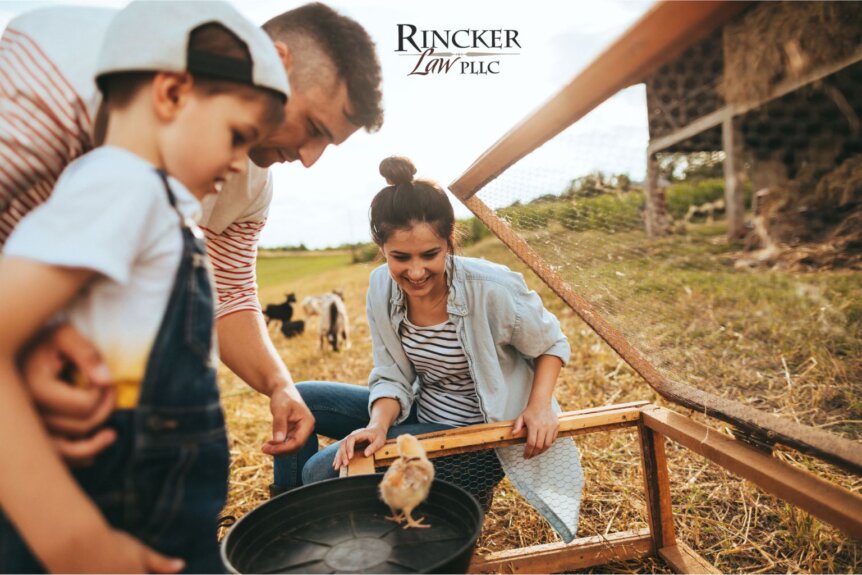Divorce is never easy, but when farmland, equipment, and agricultural businesses are involved, the process becomes even more complicated. The family farm is not just an asset—it’s a home, a livelihood, and often a legacy passed down through generations. In this article, Dividing the Family Farm in an Illinois Divorce: What Every Farmer Should Know, we share how Illinois courts handle farm property in divorce, the risks farmers face, and steps you can take to protect your land.
Why Farms Are Different in Divorce
Unlike typical marital assets, farms combine multiple types of property:
- Real estate (land and buildings)
- Equipment and machinery
- Livestock and crops
- Business interests (LLCs, corporations, or partnerships)
- Debt and operating loans
This mix of personal and business property makes farm divorces uniquely complex. Even if the farm has been in the family for generations, without proper planning, it could be treated as marital property and divided in divorce.
Illinois Divorce Law: Marital vs. Non-Marital Property
Illinois follows the rule of equitable distribution, which means property is divided fairly but not necessarily equally. The court distinguishes between:
- Marital Property: Assets acquired during the marriage, regardless of whose name is on the title. This may include farmland purchased together, equipment bought during the marriage, or income from farm operations.
- Non-Marital Property: Assets acquired before marriage, or by inheritance or gift. For example, farmland passed down from parents may be non-marital property.
The problem: Even inherited or gifted farmland can become marital if it is co-mingled—for example, if both spouses worked on it, income was shared, or marital funds were used to improve the land.
How Courts Value Farm Assets
Valuing farm property is often one of the most challenging steps in divorce. Courts may require:
- Appraisals of land and buildings
- Valuations of equipment and livestock
- Business valuations if the farm operates as an LLC or corporation
- Debt analysis to see what obligations must be shared
Because farmland values in Illinois can fluctuate significantly, accurate appraisals from agricultural experts are critical.
Common Risks for Farmers During Divorce
- Forced Sale of Farmland – If the court cannot find a fair division of assets, farmland may need to be sold, even if one spouse wishes to continue operating it.
- Partition Actions – If farmland is co-owned, one spouse can request a court-ordered sale to receive their share.
- Losing Generational Assets – Inherited farms risk being split or liquidated if ownership and finances were mingled during marriage.
- Cash Flow Problems – Buying out a spouse’s interest in the farm may strain finances or force loans.
- Tax Consequences – Transfers of land or equipment may trigger capital gains or property tax reassessments.
Protecting the Family Farm
- Prenuptial or Postnuptial Agreements
These agreements define farmland as separate property and set rules for division in case of divorce. Farmers entering marriage—or already married—should consider them.
- Business Entities
Placing farmland in an LLC or corporation can make ownership interests easier to transfer and protect the land from being divided directly.
- Detailed Recordkeeping
Keep separate accounts for farm and household finances. Avoid co-mingling inherited farmland with marital funds.
- Buy-Sell Agreements
If multiple family members own the farm, a buy-sell agreement can prevent outsiders from gaining an interest in the operation after divorce.
- Mediation and Settlement
Litigation can be costly and adversarial. Mediation allows couples to craft agreements that preserve the farm while ensuring fairness.
FAQs: Farm Divorces in Illinois
Q: Is my family farm safe if I inherited it?
Not automatically. If inherited farmland is co-mingled with marital assets or improved with marital funds, it may be treated as marital property.
Q: Can my spouse force me to sell the farm in a divorce?
Possibly. If there are no other assets to balance division, a court may order a sale or partition of farmland.
Q: How do courts decide what is “fair” in dividing farm property?
Courts consider contributions of each spouse (financial and non-financial), length of the marriage, debts, earning potential, and the needs of children.
Q: What happens to farm debt in a divorce?
Debts, like operating loans or equipment financing, are divided just like assets. Both spouses may remain responsible.
Q: Can I keep farming if I have to buy out my spouse’s share?
Yes, but you may need to take on debt or restructure your business. Planning with an attorney and financial advisor can help protect operations.
Q: How can I prevent my farm from being divided in divorce?
The best strategies include prenups, LLCs, clear records, and proactive succession planning. Early legal advice is key.
Learn How You Can Protect Your Legacy in a Farm Divorce in Illinois
Farm divorces in Illinois involve more than dividing property; they threaten a family’s livelihood and legacy. Without planning, farmland can be sold, debts mismanaged, and generational wealth lost. The good news is that farmers can take steps now to protect their operations and prepare for the unexpected.
At Rincker Law PLLC, we understand the unique challenges of farm divorces. We work with Illinois farmers to safeguard farmland, equipment, and family businesses during divorce while pursuing fair and practical solutions.
Call us today at (217) 774-1373 to schedule a consultation and protect your farm’s future.

